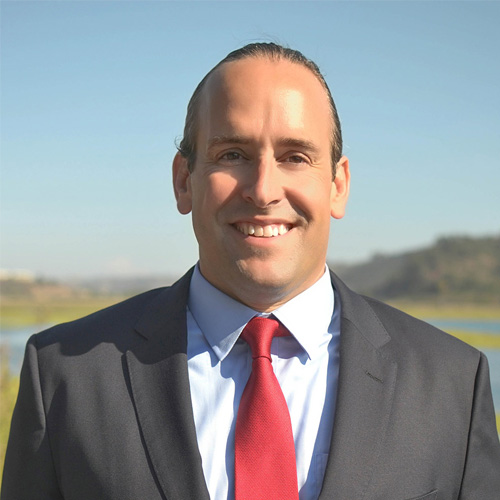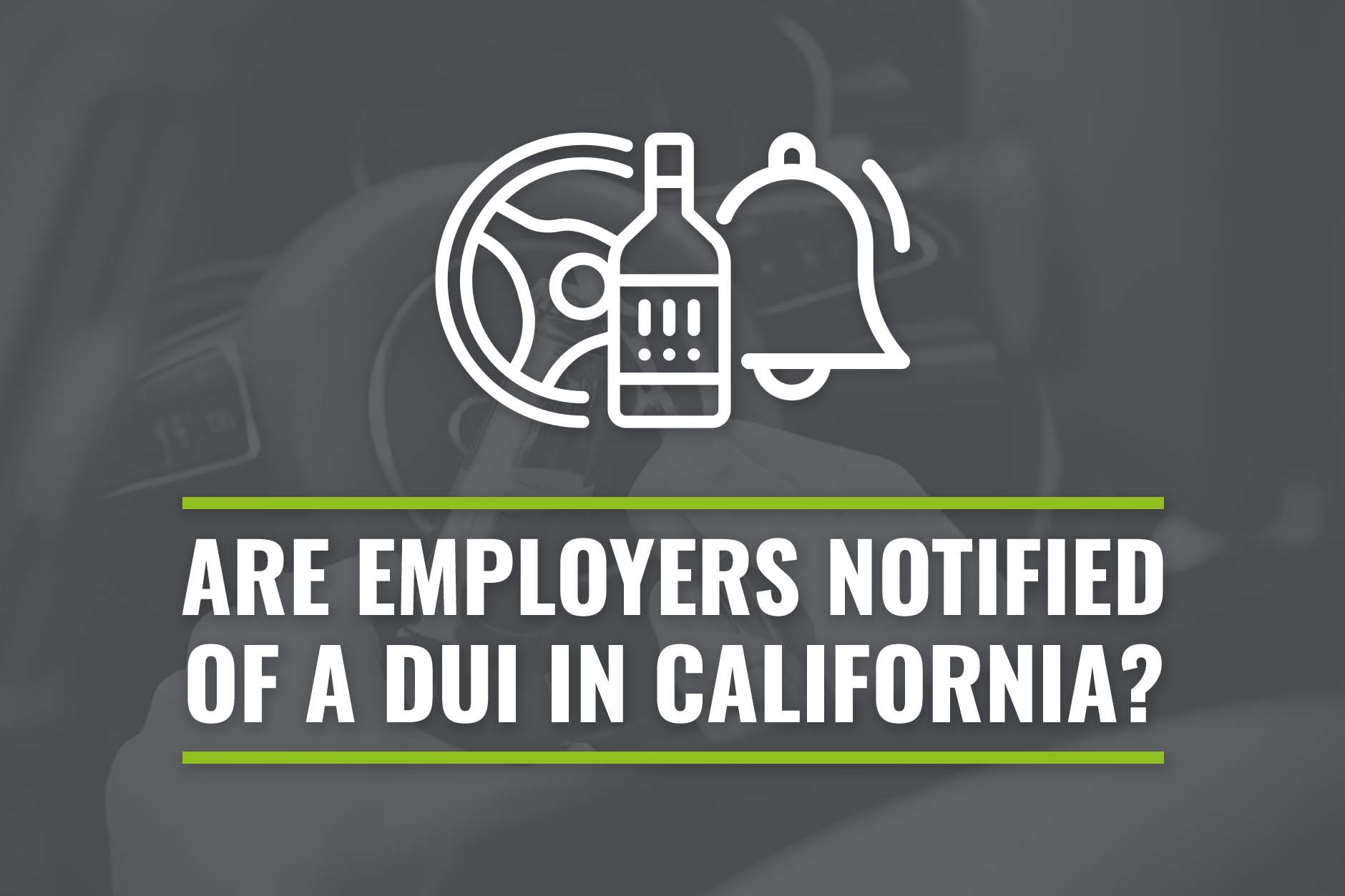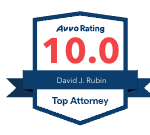Table of Contents
Quick Summary
A DUI charge can have a significant impact on your employment depending on your career. Receiving a DUI charge won’t automatically result in a notification sent to your employer, but you may need to notify your employer if you work in a profession requiring mandatory disclosure or if you work for a company requiring disclosure as part of their company policies. If you’re a professional driver, you’re likely subject to frequent driving record checks by your employer and your employer will discover your DUI charge through your driving record.
The information on this page does not constitute legal advice. Consult an attorney for further guidance before using this information.
Facing a DUI (Driving Under the Influence) charge in California is stressful, particularly when your job and career hang in the balance. Will your boss find out? Could you lose your job?
To navigate this challenging situation effectively, you need to understand your rights and be aware of the potential consequences. Knowing what to expect can help you take informed action to protect your career.
Get answers to your legal questions. Speak with a San Diego County criminal defense lawyer about your case > (619) 719-1087
How Does A DUI Affect Employment?
If your job involves driving, such as delivery, bus operation, or commercial transportation, a DUI could result in immediate suspension or termination. These roles demand a clean driving record and strict adherence to safety regulations, leading to stringent employer policies. Similarly, licensed professionals like lawyers, doctors, nurses, and teachers may face license suspension or revocation following a DUI conviction.
In California, many employers maintain rigid standards regarding criminal convictions, including DUIs. Such a conviction can result in swift dismissal or a strong reluctance to retain the employee. Attending court appearances and completing mandatory DUI programs can also lead to absenteeism, potentially affecting job performance and reliability.
The consequences of a DUI extend beyond your current employment. Finding a new job in the future can be more challenging with a DUI on your record, as it may raise concerns about your dependability and decision-making. A conviction can hinder career growth by disqualifying you from promotions or causing the loss of professional licenses.
Understanding DUI Notification Basics
Under California law, a DUI occurs when someone operates a vehicle while impaired by alcohol or drugs, as outlined in the California Vehicle Code sections §23152 (driving under the influence) and §23153 (DUI causing injury).
While a DUI charge doesn’t always trigger employer notification, there are three main scenarios where your employer may be informed:
- Mandatory Disclosure: Some professions, particularly those involving a high level of public trust (e.g., healthcare, law enforcement, education), require employees to disclose criminal charges or convictions, including DUIs. Failure to do so can result in disciplinary action or termination.
- Company Policy: Many employers have internal policies mandating the reporting of criminal charges or convictions. If you face a DUI charge, review your company’s policy to understand your disclosure obligations.
- Driving Roles: For jobs where driving is a central duty (e.g., trucking, delivery services, sales), employers frequently check driving records. A DUI or suspended license will likely appear in these checks and may jeopardize your employment.
DUI Disclosure Across Professions
Knowing how a DUI affects your job depends on your profession’s disclosure rules. Here’s what you need to know:
DUI Disclosure for Non-Driving Professions
In non-driving jobs, a DUI isn’t usually reported to your employer automatically. However, it can still affect your job if it violates company policies or impairs your ability to perform your duties. The California Fair Employment and Housing Act (FEHA) protects you from unfair treatment due to a DUI unless it directly impacts your job performance. FEHA is a state law that promotes equal employment opportunities and prevents discrimination based on various factors, including criminal history.
The Fair Chance Act, or the “ban-the-box” law (AB 1008), prevents employers from asking about your criminal history until they make a job offer. Enacted in 2018, this law aims to reduce employment barriers and support the re-entry of individuals with criminal records into the workforce by ensuring that applicants are first evaluated based on their qualifications, skills, and experience rather than their past convictions.
DUI Disclosure for Professional Drivers
For professional drivers, the rules are more stringent. Under California Vehicle Code §13352, a DUI can lead to the suspension or revocation of your commercial driver’s license (CDL), directly impacting your ability to work.
As stated above, employers in the transportation and delivery industries regularly check driving records and maintain strict DUI reporting policies to ensure safety and compliance. The DMV also updates employers on changes to your license status, making it difficult to conceal a DUI.
All of these regulations are in place to help ensure that only qualified drivers are on the road.
DUI Disclosure for Licensed Professionals
Due to rigorous regulations, licensed professionals such as dentists, nurses, and teachers must navigate DUI disclosures carefully. In most cases, you must report criminal convictions, including DUIs, to your licensing boards to uphold the high standards of that profession.
The consequences can be severe, ranging from formal reprimands (censure) to license revocation, depending on the severity and history of the offense. For example, the Medical Board of California considers DUIs as potential indicators of substance abuse or unprofessional behavior.
How Do Employers Find Out About A DUI?
Employers can learn about a DUI through six main channels:
- Background Checks
- Pre-employment background checks often include a review of criminal records.
- Current employees may be subject to periodic checks that can uncover recent DUI charges or convictions.
- Driving Record Checks
- For roles that involve driving, employers review driving records. A DUI will appear on these records, raising concerns about the employee’s ability to operate vehicles safely and legally.
- Court Notices and Public Records
- DUI charges and convictions are public records that can be accessed through court databases. Background check companies frequently use these records as part of their screening process.
- In some cases (e.g., public figures, high-profile cases), court proceedings related to DUIs may be reported by the media.
- Insurance Notifications
- If a DUI impacts an employee’s ability to drive a company vehicle, the insurance provider may notify the employer.
- Insurers may also adjust policies or premiums based on an employee’s driving record.
- Professional Licensing Boards
- A DUI can trigger a review by professional licensing boards, potentially leading to disciplinary actions.
- Self-Disclosure
- Many companies have policies that require employees to report criminal charges or convictions––including DUIs. Failure to disclose such information can result in disciplinary action or termination, particularly in positions that involve a high degree of trust or security.
Should You Tell Your Employer?
When deciding whether to disclose a DUI to your employer, it’s important to remember that you have protections under the Fair Employment and Housing Act. Review your employer’s policies to see if they require you to report any legal charges. If your job involves driving, it’s likely necessary to disclose a DUI since a suspended license directly impacts your ability to perform your duties.
Can You Be Fired For A DUI Conviction?
In most cases, California law prohibits companies from terminating employees solely based on a criminal conviction unless it directly affects your job performance. This means that a DUI alone is not typically grounds for termination.
The Americans with Disabilities Act (ADA) provides additional protections for employees recovering from alcoholism. For example, it requires employers to offer reasonable accommodations, such as time off for treatment or modified work schedules, unless it causes undue hardship for the employer. This support allows employees to seek necessary treatment without fear of losing their jobs.
Speak With A San Diego County DUI Lawyer About Your DUI Charge
While California provides robust protections for employees facing DUI charges, it’s essential to understand the potential career implications and take proactive steps to address them. Developing the right strategy, such as disclosing the incident to your employer and emphasizing your commitment to moving forward, can help minimize the impact on your professional life.
If you’ve been charged with a DUI in San Diego County, you should consult with a skilled DUI attorney who can provide invaluable guidance in understanding your rights and crafting a plan to protect your career. Remember, a DUI charge doesn’t have to derail your professional aspirations.
Attorney David Rubin has over a decade of experience defending clients with criminal charges. If you need help determining your next steps, you can speak with Attorney Rubin by calling (619) 719-1087 or filling out a contact form for a free consultation. Take action today to safeguard your future.
Additional DUI Employment Questions
Will a DUI show up on an employment background check in California?
Yes, a DUI can show up on an employment background check in California. This is especially true if the check includes your driving record or a criminal background check. Employers often do these checks when hiring or periodically, especially for jobs that involve driving.
Should I tell my boss I got a DUI?
Whether you should tell your boss about a DUI depends on your company’s policies, the nature of your job, and how the DUI affects your work. If your employment contract or company handbook requires you to disclose any criminal charges, it’s best to follow those rules and inform your employer.
How long does a DUI stay on your record for employment in California?
A DUI can stay on your criminal record indefinitely, but it’s usually reportable to most employers for ten years due to California’s background check laws. After ten years, it generally doesn’t appear on background checks for most jobs, except for certain government or high-clearance positions.
The information on this page does not constitute legal advice. Consult an attorney for further guidance before using this information.

Attorney David Rubin
Attorney David Rubin is a criminal defense and personal injury lawyer based out of Carlsbad, CA. Attorney Rubin serves clients throughout San Diego County and has been practicing law for over a decade. When not working, David can be found surfing, attending CrossFit classes, or eating asado.
 (619) 719-1087
(619) 719-1087



